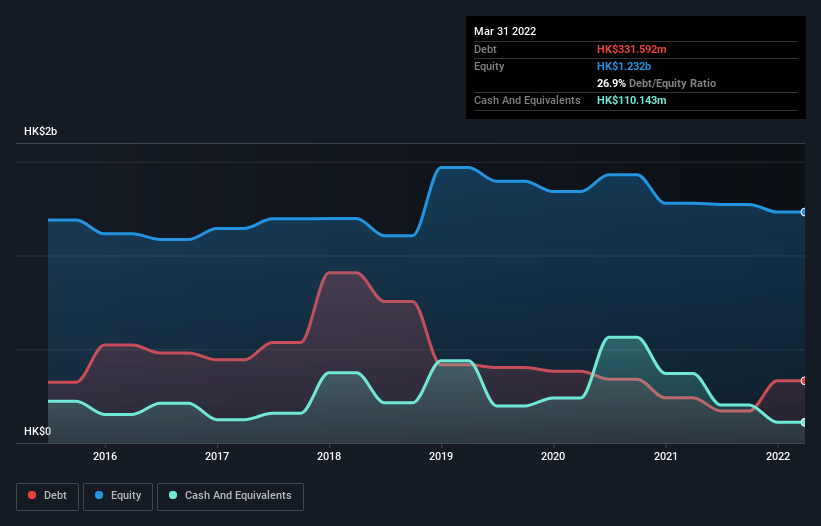- Hong Kong
- /
- Real Estate
- /
- SEHK:2288
Health Check: How Prudently Does Rykadan Capital (HKG:2288) Use Debt?

Warren Buffett famously said, 'Volatility is far from synonymous with risk.' It's only natural to consider a company's balance sheet when you examine how risky it is, since debt is often involved when a business collapses. We can see that Rykadan Capital Limited (HKG:2288) does use debt in its business. But the more important question is: how much risk is that debt creating?
Why Does Debt Bring Risk?
Generally speaking, debt only becomes a real problem when a company can't easily pay it off, either by raising capital or with its own cash flow. In the worst case scenario, a company can go bankrupt if it cannot pay its creditors. While that is not too common, we often do see indebted companies permanently diluting shareholders because lenders force them to raise capital at a distressed price. By replacing dilution, though, debt can be an extremely good tool for businesses that need capital to invest in growth at high rates of return. When we think about a company's use of debt, we first look at cash and debt together.
See our latest analysis for Rykadan Capital
What Is Rykadan Capital's Net Debt?
The image below, which you can click on for greater detail, shows that at March 2022 Rykadan Capital had debt of HK$331.6m, up from HK$241.0m in one year. However, because it has a cash reserve of HK$110.1m, its net debt is less, at about HK$221.4m.

How Healthy Is Rykadan Capital's Balance Sheet?
According to the balance sheet data, Rykadan Capital had liabilities of HK$359.3m due within 12 months, but no longer term liabilities. Offsetting these obligations, it had cash of HK$110.1m as well as receivables valued at HK$82.5m due within 12 months. So it has liabilities totalling HK$166.6m more than its cash and near-term receivables, combined.
This deficit is considerable relative to its market capitalization of HK$191.5m, so it does suggest shareholders should keep an eye on Rykadan Capital's use of debt. This suggests shareholders would be heavily diluted if the company needed to shore up its balance sheet in a hurry. The balance sheet is clearly the area to focus on when you are analysing debt. But you can't view debt in total isolation; since Rykadan Capital will need earnings to service that debt. So when considering debt, it's definitely worth looking at the earnings trend. Click here for an interactive snapshot.
In the last year Rykadan Capital had a loss before interest and tax, and actually shrunk its revenue by 48%, to HK$87m. To be frank that doesn't bode well.
Caveat Emptor
Not only did Rykadan Capital's revenue slip over the last twelve months, but it also produced negative earnings before interest and tax (EBIT). Indeed, it lost HK$5.7m at the EBIT level. When we look at that and recall the liabilities on its balance sheet, relative to cash, it seems unwise to us for the company to have any debt. So we think its balance sheet is a little strained, though not beyond repair. Another cause for caution is that is bled HK$67m in negative free cash flow over the last twelve months. So suffice it to say we consider the stock very risky. The balance sheet is clearly the area to focus on when you are analysing debt. However, not all investment risk resides within the balance sheet - far from it. Case in point: We've spotted 3 warning signs for Rykadan Capital you should be aware of, and 1 of them makes us a bit uncomfortable.
If you're interested in investing in businesses that can grow profits without the burden of debt, then check out this free list of growing businesses that have net cash on the balance sheet.
New: AI Stock Screener & Alerts
Our new AI Stock Screener scans the market every day to uncover opportunities.
• Dividend Powerhouses (3%+ Yield)
• Undervalued Small Caps with Insider Buying
• High growth Tech and AI Companies
Or build your own from over 50 metrics.
Have feedback on this article? Concerned about the content? Get in touch with us directly. Alternatively, email editorial-team (at) simplywallst.com.
This article by Simply Wall St is general in nature. We provide commentary based on historical data and analyst forecasts only using an unbiased methodology and our articles are not intended to be financial advice. It does not constitute a recommendation to buy or sell any stock, and does not take account of your objectives, or your financial situation. We aim to bring you long-term focused analysis driven by fundamental data. Note that our analysis may not factor in the latest price-sensitive company announcements or qualitative material. Simply Wall St has no position in any stocks mentioned.
About SEHK:2288
Rykadan Capital
An investment holding company, engages in the property investment and development business in Hong Kong, the United States, and the People's Republic of China.
Excellent balance sheet and good value.
Market Insights
Community Narratives


